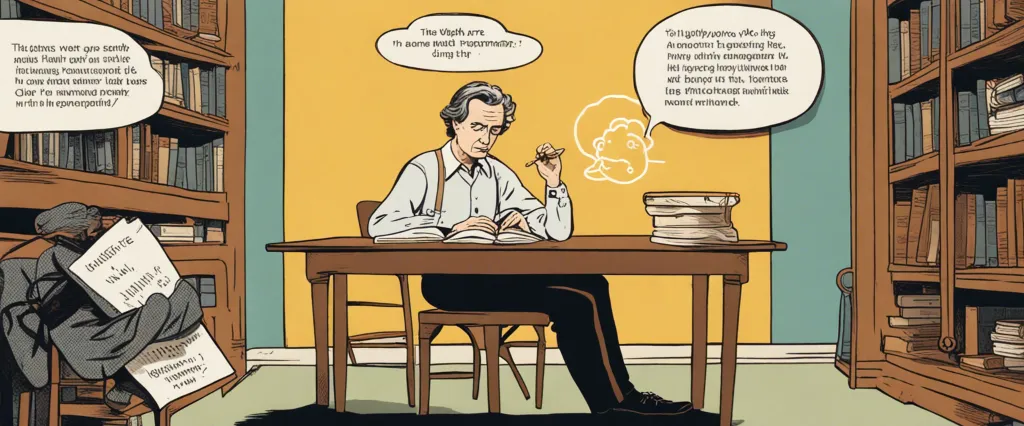——Surely you are joking Mr Feynman by Ralph Leighton & Einstein by Walter Isaacson

In the vast realm of scientific literature, certain individuals have left an indelible mark that transcends the boundaries of time and space. Two such figures, Richard P. Feynman and Albert Einstein, have captivated the minds of countless readers through their profound contributions to the field of physics. In their respective biographical works, Surely you are joking Mr Feynman written by Ralph Leighton and “Einstein: His Life and Universe” authored by Walter Isaacson, we are invited to delve deep into the lives of these scientific luminaries, discovering the extraordinary journeys that shaped their extraordinary minds.
Leighton’s “Surely You’re Joking, Mr. Feynman!” exposes readers to the playful and unorthodox personality of Richard Feynman, a Nobel laureate renowned for his work on quantum electrodynamics. Through a series of candid and often humorous anecdotes, Feynman himself takes center stage, sharing his eccentric adventures and shedding light on his unconventional approach to science and life. In contrast, Isaacson’s “Einstein: His Life and Universe” offers a meticulously researched account of Albert Einstein’s personal and professional life, delving into the inner workings of a brilliant mind that forever transformed our understanding of the universe.
While both books present captivating narratives of scientific ingenuity, they do so from distinct perspectives and with different narrative objectives. Leighton’s work acts as an autobiographical compilation of Feynman’s own stories, threaded together to reveal the persona behind the groundbreaking physicist. On the other hand, Isaacson employs a more traditional biography format, drawing upon extensive research to offer a comprehensive portrait of Einstein’s life, contextualizing his work within the broader societal and scientific landscapes.
By juxtaposing the whimsical adventures of Feynman against the comprehensive examination of Einstein’s life and work, we are presented with a unique opportunity to explore the multifaceted nature of scientific brilliance. As we embark on this comparative analysis, we shall uncover the similarities and contrasts in Feynman’s and Einstein’s approaches to science, their personal struggles and triumphs, and the profound impact they left on the world of physics. From their unyielding curiosity to their unwavering quest for truth, these two scientists offer us fascinating tales that intertwine with one another, sculpting a remarkable narrative showcasing the diversity of scientific genius.
Through the pages of Leighton’s “Surely You’re Joking, Mr. Feynman!” and Isaacson’s “Einstein: His Life and Universe,” we invite you to join us on this literary exploration, as we unravel the enigmatic lives of these extraordinary men and seek to grasp the essence of their scientific brilliance. Prepare yourself for an intellectual journey that transcends boundaries, immersing you in the vibrant lives of Richard Feynman and Albert Einstein, and forever altering your perception of the universe.
Brief Summary of Two Books
Surely you are joking Mr Feynman by Ralph Leighton
“Surely You’re Joking, Mr. Feynman!” is a memoir of Richard Feynman, an influential physicist and Nobel laureate, co-authored by Ralph Leighton. The book is based on a series of conversations and tales from Feynman’s life, offering a humorous and insightful glimpse into his experiences.
Divided into several chapters, the book takes readers on a journey through Feynman’s unconventional life. It covers his childhood and early encounters with science, including repairing radios and conducting experiments in his youth. As a young adult, he worked on the Manhattan Project and played a significant role in developing the atomic bomb.
Feynman’s mischievous personality shines through as the book recounts his adventures outside of the laboratory. He shares anecdotes about his time as an eccentric professor at Caltech, where he engaged in pranks and bet on horse races with his colleagues. Feynman also describes his love for music, art, and dancing, revealing his multifaceted personality beyond just being a brilliant physicist.
The book further delves into Feynman’s unrelenting curiosity and his thirst for knowledge. It demonstrates his ability to understand complex concepts and break them down in a way that is accessible to others, making him a beloved teacher. Feynman’s passion for learning extends beyond physics, as he explores various subjects ranging from biology to philosophy.
Moreover, the book sheds light on Feynman’s interactions with other renowned scientists, his views on education, and his involvement in investigating the Space Shuttle Challenger disaster. Throughout the memoir, Feynman’s humility and unconventional thinking are evident, inspiring readers to approach life with an open mind and embrace the joy of discovery.
In summary, “Surely You’re Joking, Mr. Feynman!” is a lighthearted and engaging memoir that showcases the brilliance, curiosity, and humor of one of the greatest physicists of the 20th century. It serves as a testament to Feynman’s unique approach to life and science, leaving readers with both a renewed sense of wonder and an appreciation for the limitless possibilities of knowledge.
Einstein by Walter Isaacson
Einstein” by Walter Isaacson is an engaging biography that delves into the life, work, and personality of one of the greatest scientific minds in history, Albert Einstein. Isaacson beautifully traces Einstein’s journey from his childhood in Germany to his groundbreaking discoveries and fame as a physicist.
The book explores Einstein’s early life, depicting his rebellious nature and nonconformist attitude toward traditional education. It delves into his struggles to find suitable employment due to his unconventional scientific ideas and his Jewish heritage. Isaacson highlights Einstein’s intellect and creativity, which enabled him to revolutionize our understanding of the universe and reshape the field of theoretical physics.
Isaacson meticulously explores Einstein’s scientific achievements, such as his development of the theory of relativity, including both the special and general theories. He explains complex scientific concepts in a manner accessible to general readers. The book also examines Einstein’s role in championing pacifism, his humanist ideals, and his activism against nuclear weapons.
Additionally, Isaacson explores Einstein’s personal life, including his tumultuous relationships, three marriages, and strained connections with his children. He delves into Einstein’s personality traits, blending brilliance with socially awkward behavior, and explains how his unique thinking led to scientific breakthroughs but also caused difficulties in his personal life.
Overall, “Einstein” provides a comprehensive and captivating portrait of Albert Einstein as both a scientific genius and a complex human being, shedding light on his intellectual contributions, personal challenges, and enduring legacy.
Comparison between Two Books

Similarities in Experts
In “Surely You’re Joking, Mr. Feynman!” by Ralph Leighton and “Einstein: His Life and Universe” by Walter Isaacson, both books provide insights into the lives of two remarkable experts in their respective fields. While Richard Feynman was a Nobel-winning physicist and Albert Einstein a renowned theoretical physicist, the books highlight several similarities about these experts.
1. Curiosity and Intellectual Prowess: Both Feynman and Einstein were known for their insatiable curiosity and exceptional intellect. They possessed a deep desire to understand the workings of the universe and were willing to dedicate their lives to exploring its mysteries. Feynman’s pursuit of knowledge and his ability to think outside the box were evident throughout his adventures, whereas Einstein’s thought experiments and groundbreaking theories demonstrated his exceptional mental capabilities.
2. Non-Conformist Attitudes: Both experts exhibited non-conformist attitudes, challenging traditional norms and methodologies. Feynman’s unconventional teaching style, which emphasized understanding over rote memorization, was a departure from conventional methods. Similarly, Einstein revolutionized physics by challenging Newtonian mechanics and introducing his theory of relativity that defied the established scientific beliefs of his time.
3. Humor and Quirkiness: Both Feynman and Einstein possessed a unique sense of humor and quirkiness that set them apart from their contemporaries. Feynman’s book is filled with humorous anecdotes and stories that showcase his ability to find joy in unconventional situations. Einstein, on the other hand, was known for his playful nature and comical expressions, endearing him to those who interacted with him.
4. Commitment to Ethical Responsibility: Despite their brilliance, both experts recognized the ethical responsibilities that came with their work. Feynman displayed a strong moral compass, evident in his refusal to work on the development of atomic weapons during World War II. Likewise, Einstein’s activism and advocacy for peace exemplified his commitment to ensuring the responsible use of scientific advancements.
5. Societal Impact: Both experts left a lasting impact on society, extending beyond their scientific contributions. Feynman’s ability to communicate complex ideas to the general public through his lectures and writings popularized science and inspired the next generation of scientists. Similarly, Einstein’s influence went beyond his scientific breakthroughs; he became an iconic figure, symbolic of intellectual curiosity and humanitarian efforts.
While Feynman and Einstein had their unique individualities, these similarities highlight their shared qualities as experts. Their intellectual brilliance, non-conformist attitudes, humor, ethical responsibility, and societal impact make them enduring figures in the scientific community and beyond.
Divergences in Experts
“Surely You’re Joking, Mr. Feynman!” is an autobiography of the physicist Richard Feynman as narrated to Ralph Leighton, while “Einstein: His Life and Universe” is a biography written by Walter Isaacson about the famous physicist Albert Einstein. Both books offer deep insights into the lives and accomplishments of these renowned scientists, but they diverge when it comes to the exploration of their expertise.
In “Surely You’re Joking, Mr. Feynman!,” Feynman’s expertise is showcased in a more informal and anecdotal manner. The book focuses on his unconventional approach to problem-solving and his ability to think outside the box. Feynman shares numerous stories about his experiences, from working on the Manhattan Project to his adventures in playing drums, painting, and even cracking safes. The book doesn’t delve deeply into the technical aspects of Feynman’s scientific work, but rather provides a glimpse into his ingenious and playful mind.
On the other hand, “Einstein: His Life and Universe” offers a detailed examination of Albert Einstein’s expertise as a theoretical physicist. Isaacson explores Einstein’s groundbreaking theories, such as special and general relativity, and explains their significance in a more technical manner. The book delves into Einstein’s intellectual development and his contributions to the fields of physics and cosmology. It also discusses his interactions with other prominent scientists and the impact of his scientific discoveries on the world.
The divergence between the two books lies in the depth of exploration of the experts’ capabilities. “Surely You’re Joking, Mr. Feynman!” focuses more on Feynman’s unconventional thinking, curiosity, and problem-solving skills, showcasing his expertise through lively anecdotes. It emphasizes Feynman’s ability to connect seemingly unrelated fields of knowledge and his approach to scientific exploration. In contrast, “Einstein: His Life and Universe” dives deeper into Einstein’s theoretical insights and the technical aspects of his work, providing a comprehensive analysis of his expertise as a physicist.
In summary, while both books offer captivating insights into the lives of two remarkable scientists, “Surely You’re Joking, Mr. Feynman!” discusses Richard Feynman’s expertise in a more anecdotal and informal manner, focusing on his unconventional thinking. “Einstein: His Life and Universe” delves deeper into Albert Einstein’s expertise as a theoretical physicist, providing a more comprehensive analysis of his scientific achievements and contributions.

Conclusion
Both books, “Surely You’re Joking, Mr. Feynman!” by Ralph Leighton and “Einstein: His Life and Universe” by Walter Isaacson, offer unique perspectives on two remarkable figures in science. The choice between the two ultimately depends on your interest and preferences. Here’s a brief overview of each book:
1. “Surely You’re Joking, Mr. Feynman!”: This book is a collection of anecdotes, told in a humorous and engaging style, about the life of Nobel laureate physicist Richard Feynman. Feynman had an extraordinary personality and his stories provide insights into his scientific mind, adventures, and offbeat perspective on life. If you enjoy witty and entertaining narratives, along with a glimpse into the mind of a brilliant scientist, this book is a great choice.
2. “Einstein: His Life and Universe”: This biography by Walter Isaacson provides a comprehensive exploration of Albert Einstein’s life and work, discussing both his scientific achievements and personal struggles. Isaacson delves into the context of Einstein’s time, capturing his intellectual development, impact on theoretical physics, and role during significant historical events. If you are interested in a detailed and well-researched biography that explores the scientific and personal aspects of one of the greatest minds in history, this book will be a valuable read.
Ultimately, it is worth considering what aspects of these figures’ lives and work intrigue you the most, as each book focuses on different elements.



